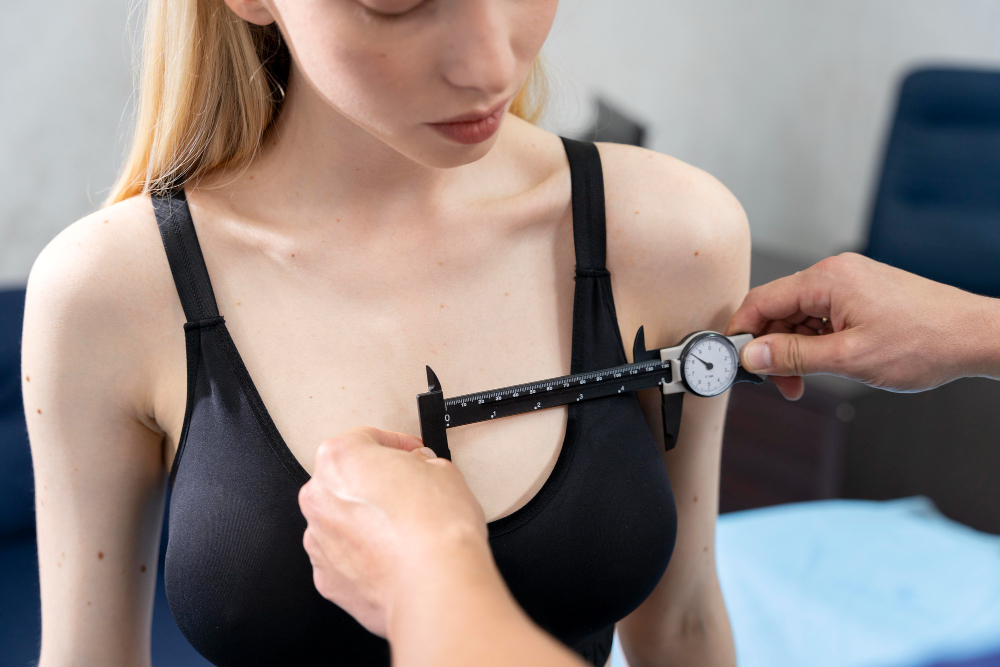Many women with large breasts suffer in several ways, like neck or back pain, rashes or fungal infections, and feel self-conscious about people noticing their breasts. Considering breast reduction surgery can help them relieve this discomfort by removing extra fat, tissue, and skin from the breast and improving their quality of life. Breast reduction surgery is a very safe and effective procedure that lifts and reshapes your breast and improves the positioning of your nipple while enhancing a person’s appearance and self-image.
Excessive large breasts can be problematic, they can cause back pain, neck pain, and discomfort during exercise. Excessive large breasts can have negative impacts on physical and emotional well-being. Breast reduction surgery can effectively address these issues, providing relief from discomfort and resulting in a more proportional and comfortable appearance. The procedure can be done under general anesthesia and the recovery time is different for everyone. It depends upon several factors including, age, genetics, type of surgical technique performed, and the amount of breast tissue to be removed.
The recovery process from breast reduction surgery generally takes several weeks. Most patients are able to return to normal activities within 4-6 weeks, but full healing can take several months. The symptoms you can expect during that time are soreness and some pain, swelling, and bruising. In order to enjoy a successful outcome after a breast reduction, there are some recovery tips to keep in mind.
How Can You Care for Yourself at Home?
Physical Activity
- It is important to wait to start any vigorous physical activity after a breast reduction until your surgeon allows it. Depending on the extent of the procedure, most surgeons recommend waiting for at least 6 weeks before resuming normal physical activity.
- During this time, listen to your body and also avoid lifting anything that would make you strain. This may include heavy grocery bags and milk containers, a heavy briefcase or backpack, cat litter or dog food bags, a vacuum cleaner, or a child.
- Gentle stretches and light walking are good options to start with and can help promote blood circulation and reduce your chances of complications and blood clots while minimizing postoperative swelling.
Diet
- It is important to eat a variety of fruits and vegetables as you can. Also, include whole grains and lean proteins in your diet. They keep your body strong and healthy while helping you heal quickly.
- Try to take meals that are high in nutrients and low in sodium. Too much sodium after surgery can cause bruising and swelling.
- Be sure to drink a lot of water during your recovery period. They help promote healing and minimize complications.
- Avoid drinking alcohol for a few weeks after your reduction surgery. This is because alcohol can affect your risk of surgical complications, your results, and your healing.
Incision Care
- Avoid bathing or showering for two to three days after the surgery. As after surgery. Showering too soon after surgery may have an adverse effect on your healing while causing your incision to re-open. As a result infection, or worsen your surgical scars.
- If you start to feel uncomfortable during this time, you can try to take a sponge bath. Be sure to avoid the incision area entirely.
- After the first 48 hours, take a shower every day as they help to keep the incision area clean. Try to avoid long showers. Also, make every effort to keep your incisions out of direct contact with water until the wounds are closed.
- Keep yourself out of jacuzzis, hot tubs, pools, or natural bodies of water until your incisions sites are fully healed.
- While your incisions are healing, wear a soft supportive bra, even while sleeping for 6 weeks after your surgery.
- Do not wear an underwire bra for 1 month or until your doctor says to wear it.
Medications
- After the surgery, your breast feels pain and soreness for a few days which disturbs your sleep. It is recommended to have prescribed medication to avoid the risk of infection and reduce surgery pain.
- Take medication with food to minimize the risk of nausea or exactly as directed by your cosmetic surgeon.
The Final Tips
Every patient’s recovery is unique and can be affected by a variety of factors, such as the surgery type, overall health, and healing rate. Taking care of yourself is an essential part of the healing process after breast reduction surgery. Following the instructions from your cosmetic surgeon, taking prescribed medication, consuming a healthy diet, and taking plenty of rest are effective ways to manage post-surgery pain. This can help you reduce the risk of complications and achieve the best results.

